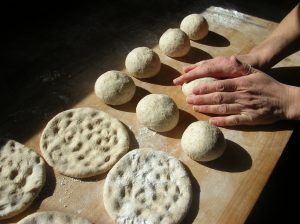
So Abraham hurried into the tent to Sarah and said, “Quickly, make ready three measures of fine meal; knead it and make cakes.” And Abraham ran to the herd, took a tender and good calf, gave it to a young man, and he hastened to prepare it. So he took butter and milk and the calf which he had prepared, and set it before them; and he stood by them under the tree as they ate.
– Genesis 18:6-8
It had to be one of the strangest days in the life of Abraham and Sarah. The Lord Almighty dropped in for a quick visit on His way to destroy Sodom, to promise them a son within the year.
Sarah did not have time to let it raise. She made it in haste, so it was Matzoh flatbread. This was the bread of Abraham’s communion with YHVH when He visited him by the oaks at Mamre. It became a pattern for fellowship with God, with some interesting details we usually miss. It wasn’t just a certain kind of bread – it was bread made in haste.
The theme reprises in the life of the nation of Israel when they left Egypt in haste. They marched for seven days, both day and night, and only had time to make flatbread during the short rests.
seven days you shall eat unleavened bread with it, that is the bread of affliction (for you came out of the land of Egypt in haste), that you may remember the day you came out of the land of Egypt all the days of your life.
– Deut. 16:3 LXX
In the Passover feast regulations, they were commanded to eat the Matzoh bread with sandals on, standing up, girded for travel with staff in hand, as if in haste.
Even today in Jewish bakeries where Matzoh bread is made, the bakers run to and fro screaming because the bread dough must not be allowed time to raise. It has to be moved in haste from the rolling tables to the ovens.
In Hebrew, the word for commandment is Mitzvah, and the word for unleavened bread is Matzoh. In the Old Hebrew, they left out the vowels, so the spelling of these two words is the same. Jews equate making the bread of haste with obeying the Lord quickly. When a person delays in their obedience, it reveals hidden rebellion in the heart, like the woman who hid leaven in the three measures of meal.
It takes time for yeast to raise bread. If you wait too long, the dough becomes unusable, and must be thrown out. Yeast is used in scripture to represent hidden sin in hearts – especially the sin of pride – because it puffs up. Jesus said he is lowly in heart. He comes down and meets us at our level, fully human even though he is God.
In the parable of the sower, some of the seed fell upon the path that was trodden down, onto hard packed dirt. The birds of the air came and ate it, because it was not absorbed into the soil quickly. It isn’t enough to obey someday; while we wait the evil one comes and snatches up the word God has given to us. We must receive God’s word quickly and act upon it, or not at all.
Whenever we see someone receive God’s commandment – or Mitzvah – and act on it in haste, we are seeing faithfulness. Abraham did not wait to take Isaac to Mount Moriah. He arose early in the morning and left before daybreak on the same night he heard from God.
When a person hears the Lord speaking and comes forward immediately, and remains afterward, that is faithfulness. Look for this trait in the people you must trust, and remember this when you hear from God. The bread of haste – or Matzoh – is a picture of your communion with God.